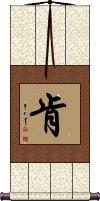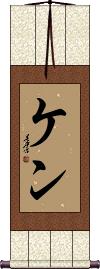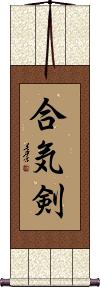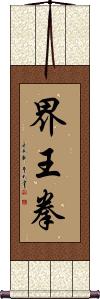The Name Ken in Japanese/Chinese on a Custom-Made Wall Scroll.
Click the "Customize" button next to your name below to start your personalized ken calligraphy artwork...
Aiki-Ken
Kaio-Ken
Kaio-Ken
Ken Zen Ichi Nyo
拳禪一如 is a Japanese phrase that is often translated as “train both body and spirit.”
Here's the breakdown of the words in this phrase:
拳 means fist.
禅 is zen, which means meditation.
一如 is a word that means “to be just like,” “oneness,” “true nature,” or “true character.”
So to get to the translation of “train both body and spirit,” you must understand that “fist” is representing “body” and the idea of meditation is representing “mind.”
I have to say, this is not how I would translate this. To me, it's really about training with your mind and remembering that meditation is a huge part of training, not just your fist. As the Shaolin Buddhist monks show us, meditation is just as important as physical training in martial arts.
Ki Ken-Tai Icchi
気剣体一致 is the title Ki Ken-Tai Icchi.
気 = energy, 剣 = sword, 体 = body, 一致 = synchronization/unity. So, “energy, sword, and body in unison” would be one way to translate this. Sometimes written with the possessive article, の, making it 気剣体の一致 or “Ki Ken-Tai no Icchi.” Let me know in the special instructions if you want that の character added by the calligrapher.
Kunshi no Ken
君子の拳 is “Kunshi no Ken” in Japanese.
The meaning is literally “Noble Fist” or “Fist of Nobility” but it's often used to describe the effort to concentrate on cultivating oneself to become a well-rounded, respectful individual.
You will see 君子の拳 sometimes written in the full Kanji form of 君子之拳. Both versions mean the same thing. If you want this more traditional Kanji version, just let me know when you place your order.
Ken To Ashi Do
Bagua Fist
八卦拳 can be translated as “Bagua Fist.”
八卦 = Bagua or Eight Trigrams.
拳 = Fist.
The following table may be helpful for those studying Chinese or Japanese...
| Title | Characters | Romaji (Romanized Japanese) | Various forms of Romanized Chinese | |
| Ken | 肯 | kěn / ken3 / ken | k`en / ken | |
| Ken | ケン | ken | ||
| Aiki-Ken | 合気剣 | ai ki ken / aikiken | ||
| Kaio-Ken | 界王拳 | kai ou ken / kaiouken / kai o ken | jiè wáng quán jie4 wang2 quan2 jie wang quan jiewangquan | chieh wang ch`üan chiehwangchüan chieh wang chüan |
| Kaio-Ken | 界王拳 | kai ou ken / kaiouken / kai o ken | jiè wáng quán jie4 wang2 quan2 jie wang quan jiewangquan | chieh wang ch`üan chiehwangchüan chieh wang chüan |
| Ken Zen Ichi Nyo | 拳禪一如 拳禅一如 | ken zen ichi nyo kenzenichinyo | ||
| Ki Ken-Tai Icchi | 気剣体一致 | ki ken tai icchi kikentaiicchi ki ken tai ichi | ||
| Kunshi no Ken | 君子の拳 | kun shi no ken kunshinoken | ||
| Ken To Ashi Do | 拳と足道 | ken to ashi dou kentoashidou ken to ashi do | ||
| Bagua Fist | 八卦拳 | hakke ken / hakkeken / hake ken | bā guà quán ba1 gua4 quan2 ba gua quan baguaquan | pa kua ch`üan pakuachüan pa kua chüan |
| In some entries above you will see that characters have different versions above and below a line. In these cases, the characters above the line are Traditional Chinese, while the ones below are Simplified Chinese. | ||||












